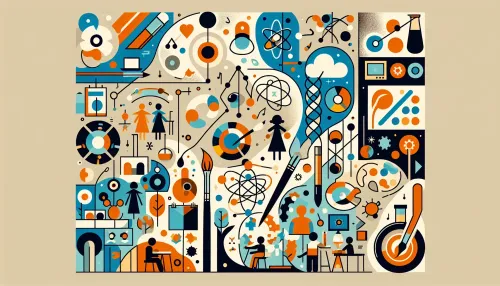Collective Genius: Mapping the Future of Autism Care With Crowdsourced Data

Autism care and research have entered a new era with the advent of crowdsourced data. In recent years, the democratization of information gathering has had a profound impact on understanding and supporting autistic children. Let's delve into the groundbreaking insights and future predictions that emerge from this transformative shift.
Understanding the Impact of Crowdsourced Data on Autism Care
Traditionally, data collection in autism research has been limited to controlled clinical settings, offering only a narrow view of the diverse experiences and challenges faced by autistic individuals. However, the rise of crowd-sourced research has broken down these barriers by harnessing the power of collective input from families, caregivers, educators, and researchers. This inclusive approach has led to a more comprehensive understanding of autism, encompassing its multifaceted nature and individual variations.
How crowd-sourced research is transforming autism understanding
The shift towards large-scale collaborative efforts in autism therapy has proven to be a gamechanger. By aggregating data from diverse sources and contributors, researchers have gained unprecedented insights into the effectiveness of therapeutic interventions. Crowd-sourced data has not only validated existing practices but also paved the way for innovative approaches tailored to the unique needs of autistic children. The future holds promise for a more expansive repertoire of therapy options, specifically designed to enhance the well-being and development of autistic individuals.
Related Article: Charting the Unseen Spectrum: Advancements in Neuroimaging for Autism Understanding
Innovative Insights from Large-Scale Collaborative Autism Therapy
Crowdsourced data has catalyzed a ripple effect in the realm of autism support services. By harnessing collective wisdom, organizations and support groups can now tailor their offerings with greater precision, addressing the specific needs identified through community-contributed data. This amplification of support services ensures that autistic children receive targeted assistance, ultimately enhancing their quality of life and fostering a more inclusive society.
One of the most transformative outcomes of crowdsourced autism data is the breaking down of silos that have traditionally segmented research and treatment efforts. This collaborative approach has facilitated cross-disciplinary synergy, enabling experts from diverse fields to converge their knowledge and insights. As a result, holistic care models are on the horizon, integrating medical, educational, and behavioral perspectives to provide comprehensive support frameworks for autistic children.
The role of aggregated data in therapy effectiveness
Looking ahead, crowd analytics is poised to revolutionize autism care by enabling predictive models and personalized care plans. The wealth of data contributed by individuals across the spectrum will serve as the foundation for advanced analytics, allowing for early intervention strategies based on predictive indicators. Moreover, personalized care plans tailored to each child's unique profile will be devised through sophisticated algorithms, optimizing outcomes and transforming the landscape of autism care.
Related Article: The Genetic Enigma of Autism: Elucidating the Role of DNA in ASD
The Ripple Effect of Shared Data on Autism Support Services
The sheer volume of crowd-sourced data has unlocked intricate patterns that were previously obscured in smaller-scale studies. This wealth of big data presents an unprecedented opportunity to identify novel strategies for autism interventions. By analyzing vast datasets, researchers can discern subtle trends and correlations that illuminate unexplored avenues for tailored interventions, thus enriching the arsenal of supportive measures available for autistic children.
How community data enhances support offerings
In the quest for precision diagnostics, community-contributed datasets are proving to be invaluable assets. By collating real-world experiences and observations from diverse contributors, these datasets are refining diagnostic tools to capture the expansive spectrum of autistic traits more accurately. As this trend advances, diagnostic criteria will evolve to encompass a broader array of characteristics, ensuring that no aspect of an individual's unique presentation goes unnoticed or unaddressed.
This forward-looking exploration underscores the profound impact crowdsourced data is having on shaping the future landscape of autism care and research. The collective genius emerging from inclusive collaboration promises holistic advancements that honor the diversity and complexity within the autistic community.
Frequently Asked Questions
Crowdsourced data is enhancing autism diagnostics by compiling real-world experiences from diverse contributors. This collective input helps refine diagnostic tools, allowing them to capture a broader spectrum of autistic traits. As these datasets evolve, they ensure that unique characteristics of individuals are recognized and addressed more accurately, leading to improved diagnostic criteria.
Large-scale collaborative efforts in autism therapy provide significant benefits by aggregating diverse data sources. This approach offers researchers unprecedented insights into therapeutic effectiveness, validating existing practices while fostering innovative interventions tailored to individual needs. Ultimately, it enhances the well-being and development of autistic children through personalized therapy options.
Cross-disciplinary collaboration is crucial in autism care as it breaks down traditional silos between research and treatment. By integrating knowledge from various fields, experts can develop holistic care models that encompass medical, educational, and behavioral perspectives. This comprehensive approach ensures that autistic children receive well-rounded support tailored to their unique needs.
Check Out These Related Articles

The Scientific Canvas: Fostering Scientific Inquiry through Creative Exploration for Autistic Children

The Science of Happiness in Autism: Uncovering Joy in Neurodiversity

Myth vs. Reality: Unraveling Sensory Sensitivities in Autism
